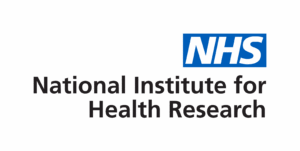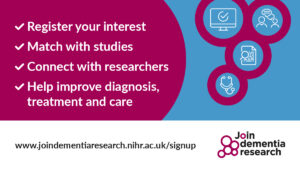We are pleased to be part of the National Institute for Health Research Clinical Research Network (NIHR CRN) for Wessex. This means we are part of a network of GP partnerships who host medical research on a regular basis. Findings from research studies help all GPs, nurses and other health professionals provide the most appropriate and up-to-date care. Patients registered with us have an opportunity to help shape the future of health care by taking part in research projects.

As a member of the Clinical Research Network, we will from time to time invite patients to take part in research studies. You will always receive clear information about what taking part in any research study would involve. You will have the opportunity to ask questions and obtain further details about the study with no obligation to take part.
There are various ways a patient can become involved in studies at Living Well and requirements vary from study to study and if you choose to take part, this could include:
-
Filling in a questionnaire
-
Talking to a researcher about your views/symptoms
-
Letting the researcher look at your medical notes
-
Trying a new treatment, therapy or device
-
Experiencing new combinations or timings of treatments
-
Providing samples for testing (blood, urine, breath etc.)
You may be sent information via a text message, through the post, or read information about a current study in the patient waiting room or on the surgery website and wish to take part or your GP/nurse may discuss the study in a consultation where appropriate.
Participation in any research project is entirely voluntary and you can withdraw at any time throughout any study. Declining or withdrawing from any study will not affect your medical care in any way.
More information about some of our active research projects can be found below.
RCGP Research & Surveillance
 This practice is one of over 1900 practices in England and Wales contributing pseudonymised data for national research and surveillance. These data enable continuous monitoring of infections and diseases in the community and is used in ethically approved research. The Oxford RCGP RSC is the main source of information for Public Health England (PHE) and helps with prediction and management of flu outbreaks and pandemics.
This practice is one of over 1900 practices in England and Wales contributing pseudonymised data for national research and surveillance. These data enable continuous monitoring of infections and diseases in the community and is used in ethically approved research. The Oxford RCGP RSC is the main source of information for Public Health England (PHE) and helps with prediction and management of flu outbreaks and pandemics.
Providing pseudonymised data does not affect patients, their care or privacy, however if you no longer wish to allow your information to be used, please submit an Admin eConsult.
The pseudonymised data, extracted by information service providers, Wellbeing Software and Egton Medical Information Systems (EMIS), are processed within the private and secure network of the Clinical Informatics and Health Outcomes Research Group at University of Oxford under a formal data sharing agreement. The pseudonymised data may be linked with other NHS data for analysis, including hospital episode statistics.
For further information please visit http://www.rcgp.org.uk/rsc or contact:
Prof Simon de Lusignan (Data Controller) Oxford RCGP RSC Practice Liaison Team
MedicalDirectorRSC@rcgp.org.uk Practiceenquiries@phc.ox.ac.uk
Below is a list of the studies we are currently recruiting for. If you would like to participate in any of these and think you qualify please submit an a request at the top of the page stating which study you are interested in.
This study is looking for children between ages of 5-15 with mild asthma to see if taking a preventer inhaler when they need it is as good as taking it every day.
Study website – asymptomatic-trial.org.uk

This study is trialling using a medical device to improve ADHD symptoms.
For more details contact: attens@soton.ac.uk
This trial is looking for eligible patients with Shingles and seeing if Amitriptyline can prevent long term pain from the virus.
Study website – https://athena-study.bristol.ac.uk/
This research study aims to find out whether people with chronic kidney disease (CKD) should take a daily low-dose aspirin tablet to reduce the risk of a heart attack or stroke.
We are inviting all potentially suitable patients to take part. This includes people aged 18 or over who have had blood or urine tests that indicate they have CKD.
CKD has 5 different stages. Stage 1 technically is normal however, as medicine is progressing we are picking up and defining some very early diagnoses before they make anyone unwell. Some patients may be receiving the invite as early as stage 1 as they fulfil the extensive criteria of this study. If you receive a letter about this study we really do not want you to worry but to understand that participation is entirely voluntary to this study and regardless of participation or the CKD stage you will be monitored as current guidance recommends. Please look out for emails and texts inviting you for annual blood tests, blood pressure and urine tests.
There is some excellent information for further advice available at the Kidney Information website.
If you have any further concerns, please do not hesitate to drop us an eConsult and if you mark this specifically for the attention of Dr Pritti Aggarwal the Principal Investigator for the Living Well Partnership, she will get back to you in due course.
This trial is looking for patients with atrial fibrillation to can try a newer anticoagulant (blood thinning tablets) to prevent serious long-term complications.
Study website – birmingham.ac.uk/research/cardiovascular-sciences/research/dare2think/patients-public/index.aspx
This study is looking to see if a novel way of testing for asthma FeNO can actually be used to monitor patients progression and guide their treatment.
Study website – phctrials.ox.ac.uk/studies/define
Join Dementia Research is a nationwide service that allows people to register their
interest in taking part in dementia research studies. People with dementia, their carers or
those that provide support and anyone over 18 interested in research can sign up.
Join dementia research – register your interest in dementia research : Home (nihr.ac.uk)

This study is aiming to personalise treatment for patients with depression using a health tool kit.
Study website – psych.ox.ac.uk/research/evidence-based-mental-health/petrushka-trial
This is a study looking to test a new way of identifying liver disease in people living with type 2 diabetes.
Study website – reflexstudy.org
This study aims to explore whether sounds, such as breathing, speaking and coughing, can be used to predict whether someone with cough caused by infection is likely to get better or worse using an App to record your voice.
Details and to join the study – RELOAD
uMed support LWP by inviting our patients to various studies. The studies will be signed off by the Practise as relevant to the patient’s health circumstances.
This study is looking for biomarkers in patients with depression, bipolar and schizophrenia. Patients will be asked for a blood sample and to complete some questionnaires.
Details here – UK Minds
